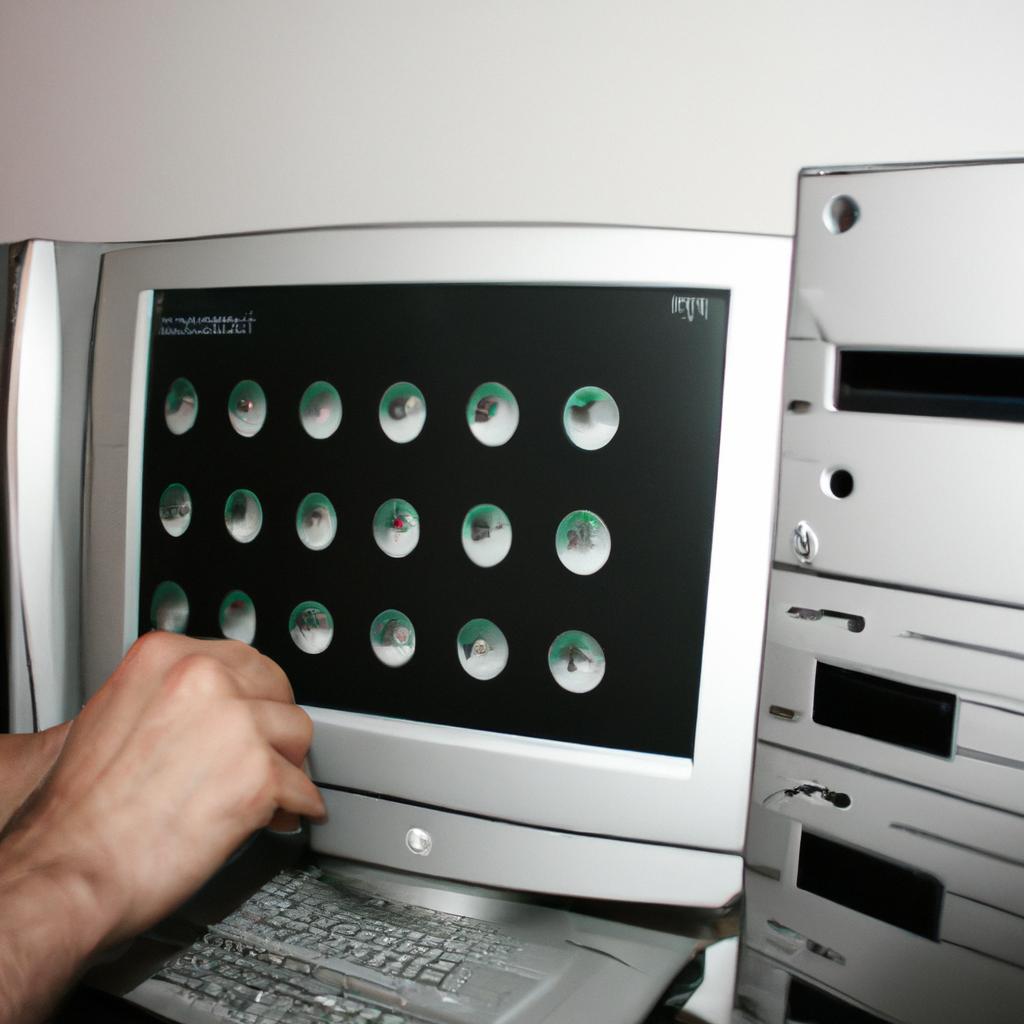Emulators have become an integral part of modern computer systems, enabling users to replicate the functionality of one system on another. These software programs are designed to imitate the behavior of hardware or software components and provide a platform for running applications that were originally developed for different systems. One such example is the use of free and open-source emulators, which allow individuals to access and utilize legacy software or games from platforms no longer supported by their current operating systems.
In recent years, there has been a surge in the popularity of free and open-source emulators due to their versatility and accessibility. For instance, consider a hypothetical scenario where an avid gamer wishes to relive their childhood memories by playing classic console games from the 90s. However, they find themselves facing a major obstacle as these games can only be played on outdated gaming consoles that are no longer available in the market. In this situation, free and open-source emulators come to the rescue by providing a means to run these vintage games on modern computers, allowing individuals to indulge in nostalgia without having to invest in rare and expensive gaming hardware.
The world of emulator loans offers intriguing possibilities for researchers, developers, gamers, and enthusiasts alike. This article explores the realm of free and open-source emulators within the context of software development and preservation of technological history.
For researchers, free and open-source emulators provide a valuable tool for studying the evolution of computing systems. By emulating older hardware or software platforms, researchers can analyze the behavior and performance characteristics of these systems without the need for physical access to the original devices. This enables them to conduct experiments, perform testing, and gather data that can contribute to a better understanding of past technologies.
Developers also benefit from free and open-source emulators as they can use them to test their applications across different platforms. Instead of having to procure multiple devices or virtual machines, developers can simply run their software on an emulator that mimics the target environment. This saves time, resources, and ensures compatibility with a wide range of systems.
Gamers are perhaps one of the largest user groups who benefit from free and open-source emulators. These emulators allow gamers to revisit classic titles that may otherwise be inaccessible due to hardware limitations or discontinued consoles. The ability to play retro games on modern computers not only provides entertainment but also helps preserve gaming history by ensuring these games remain playable for future generations.
Enthusiasts in various fields such as music production, graphic design, or even robotics can leverage free and open-source emulators to interact with legacy software or hardware components that are no longer commercially available. This opens up new possibilities for creative expression and experimentation by granting access to tools and technologies that were once considered obsolete.
In conclusion, free and open-source emulators have revolutionized the way we engage with technology from the past. They offer a flexible solution for running software or games originally designed for different systems, making it possible for researchers, developers, gamers, and enthusiasts alike to explore and utilize legacy technologies in today’s digital landscape.
What are Emulators?
Emulators play a crucial role in the world of computer systems by enabling one system, known as the host, to imitate another system, referred to as the guest. These software applications or hardware devices have gained significant popularity due to their ability to recreate a wide range of platforms and operating systems. To grasp the concept more effectively, let’s consider an example: imagine you have a modern gaming console but wish to experience playing classic games from older consoles like the Super Nintendo Entertainment System (SNES). In this case, an emulator would allow your current system to replicate the functionality of the SNES, allowing you to enjoy those nostalgic games.
To engage readers and evoke an emotional response regarding the subject matter, we can introduce a bullet point list highlighting some key advantages of emulators:
- Preservation: Emulators contribute significantly to preserving digital history by enabling access to outdated software and hardware.
- Accessibility: They provide opportunities for individuals who may not have physical access to certain technologies or resources.
- Customization: Emulation allows users to customize their experiences by modifying settings such as graphics, sound quality, and controls.
- Research and Development: Emulators serve as valuable tools for researchers and developers interested in studying historical computing environments or creating new software.
Additionally, we can integrate a table into this section that showcases popular examples of both commercial and open-source emulators:
| Commercial Emulators | Open-Source Emulators |
|---|---|
| PlayStation 4 | RetroArch |
| Xbox Series X | Dolphin |
| Nintendo Switch | MAME |
| Sega Genesis | PPSSPP |
In conclusion, emulators are software applications or hardware devices that enable one computer system to mimic another. By providing various benefits such as preservation, accessibility, customization options, and research possibilities, these versatile tools offer users unique experiences while contributing to the field of computing. In the following section, we will explore in detail the benefits of utilizing free and open-source emulators for computer systems.
[Transition Sentence] Moving forward, let’s delve into the advantages offered by free and open-source emulators.
Benefits of Free and Open-Source Emulators
To further understand the world of emulators, it is crucial to explore their limitations and potential drawbacks. Let us consider a hypothetical scenario where an individual decides to use a free and open-source emulator to run a popular gaming console’s games on their computer. Initially excited about reliving nostalgic memories, they encounter some unexpected challenges.
Firstly, compatibility issues can arise when using emulators. While many emulators strive for accuracy in replicating the hardware and software environment of the original system, there may still be instances where certain games or applications do not function correctly or at all. This can lead to frustration as users invest time and effort into setting up the emulator only to find that their desired game does not work as expected.
Secondly, performance optimization can be challenging with emulators. Running complex software designed for specific hardware platforms on different architectures often requires significant computational resources. In some cases, this can result in decreased performance or even unplayable experiences due to high system requirements. Users may need powerful computers with advanced processors and dedicated graphics cards to achieve desirable results.
Furthermore, legal considerations must also be taken into account when using emulators. Although many emulators are developed by enthusiasts without any intention of infringing copyright laws, running commercial games on emulated systems typically violates intellectual property rights unless explicit permission has been obtained from the copyright holder. Engaging in such activities could potentially lead to legal consequences if discovered.
Despite these limitations, free and open-source emulators continue to captivate individuals seeking alternative ways of experiencing classic video games or exploring other operating systems within virtual environments. By understanding these constraints beforehand, users can make informed decisions regarding which emulation projects suit their needs best.
Now let us delve deeper into popular free and open-source emulator platforms that have gained considerable recognition among gaming communities and technology enthusiasts alike.
Emulator Limitations:
- Compatibility issues may arise
- Performance optimization challenges
- Legal considerations
| Emulator Limitations | |
|---|---|
| Compatibility Issues | – Some games may not work as expected- Certain applications may be incompatible |
| Performance Optimization Challenges | – High system requirements – Decreased performance or unplayable experiences due to hardware differences |
| Legal Considerations | – Running commercial games on emulated systems violates intellectual property rights unless permission is obtained from the copyright holder |
Next, we will explore popular free and open-source emulator platforms that have gained considerable recognition among gaming communities and technology enthusiasts alike.
Popular Free and Open-Source Emulator Platforms
In the previous section, we explored the various benefits that free and open-source emulators offer to computer systems. Now, let us delve deeper into some popular platforms that exemplify these advantages.
One such platform is RetroArch—an all-in-one emulator software that supports a wide range of gaming consoles and operating systems. With its user-friendly interface, RetroArch allows users to easily navigate through their game libraries and customize their gaming experience. Furthermore, it offers cross-platform compatibility, enabling gamers to enjoy their favorite titles on different devices seamlessly.
When considering the benefits of free and open-source emulators like RetroArch, several key features stand out:
- Flexibility: Free and open-source emulators are highly customizable, allowing users to modify settings according to their preferences. This flexibility empowers individuals to optimize performance based on hardware capabilities or personal requirements.
- Community support: The active communities surrounding free and open-source emulators provide a wealth of resources for troubleshooting issues or discovering new features. These communities foster collaboration among enthusiasts who share a common passion for retro gaming experiences.
- Preservation of gaming history: By using free and open-source emulators, users contribute to preserving video game history by enabling access to older games on modern systems. This preservation fosters nostalgia while also introducing younger generations to classic titles.
- Cost-effectiveness: Unlike proprietary emulators that may require paid licenses or subscriptions, free and open-source alternatives eliminate any financial barriers associated with accessing gaming emulation software.
To showcase the impact of free and open-source emulators in practice, consider this hypothetical scenario: A group of passionate gamers comes together during a retro gaming convention. They bring along their diverse collection of original cartridges spanning multiple consoles from various eras. Using an emulator like RetroArch running on inexpensive single-board computers connected to large screens, they recreate the authentic experience of playing those games without needing each console individually.
In summary, free and open-source emulators provide numerous benefits such as flexibility, community support, preservation of gaming history, and cost-effectiveness. These advantages empower users to create their ideal gaming environment while fostering a sense of camaraderie among retro gaming enthusiasts.
Key Features to Consider in Emulator Selection
To better understand the world of emulator loans in computer systems, let’s take a closer look at some popular free and open-source emulator platforms. One such platform is RetroArch, which offers a wide range of emulators for various gaming consoles, allowing users to experience their favorite retro games on modern devices.
RetroArch stands out due to its user-friendly interface and extensive library of supported game cores. It provides cross-platform compatibility, enabling users to enjoy nostalgic gaming experiences on different operating systems like Windows, macOS, Linux, Android, iOS, and even game consoles like PlayStation and Xbox. With regular updates and an active community-driven development model, RetroArch ensures that users can access the latest features and bug fixes.
When selecting an emulator platform for your needs, several key features should be considered:
- Compatibility: Ensure that the emulator supports the specific console or system you intend to emulate.
- Performance: Look for emulators that provide smooth gameplay without significant lags or glitches.
- Customization Options: Consider platforms that offer options to customize controls, graphics settings, and audio preferences according to your preference.
- Additional Features: Some emulators may include additional features like save states (allowing you to save progress at any point) or cheat code support.
Emotional Bullet Points
- Emulation brings back cherished childhood memories
- The nostalgia factor makes using emulators a delightful experience
- Rediscovering forgotten gems through emulation creates moments of joy
- Emulating old games fosters a strong sense of community among fans
Additionally, it is helpful to compare various emulator platforms based on these criteria before settling on one that meets your requirements. The table below showcases a comparison between RetroArch and another popular emulator platform called Dolphin:
| Feature | RetroArch | Dolphin |
|---|---|---|
| Console Support | Multiple retro consoles | Nintendo GameCube and Wii |
| Performance | Smooth gameplay with occasional frame drops | Excellent performance on high-end hardware |
| Customization | Highly customizable controls and settings | Limited customization options |
| Additional Features | Save states, shaders, cheat code support | Advanced graphical enhancements, netplay |
In conclusion, exploring popular free and open-source emulator platforms like RetroArch can provide an enjoyable way to experience classic games from yesteryears. With a wide range of supported systems, user-friendly interfaces, and customization options available, these emulators offer a gateway back into the past for gaming enthusiasts. However, it is essential to consider factors such as compatibility, performance, customization options, and additional features when selecting the most suitable platform. In the following section, we will delve into some challenges that users may encounter while using emulators.
Transitioning smoothly into the subsequent section about “Challenges in Using Emulators,” it is important to be aware of potential obstacles faced during emulation journeys.
Challenges in Using Emulators
Having discussed the key features to consider in emulator selection, it is important to acknowledge the challenges that can arise when using emulators. Understanding these challenges will allow users to make informed decisions and mitigate potential issues.
Emulator usage comes with its own set of complexities and obstacles that users must navigate. To illustrate this point, let’s consider a hypothetical scenario where a software development team decides to use an open-source emulator for testing their application across different platforms. They encounter several challenges during the process:
-
Performance Limitations: Emulators often struggle to replicate the exact performance of real hardware systems due to various factors such as limited processing power or inadequate graphics capabilities. This can result in slower execution times and compromised user experience, especially when dealing with resource-intensive applications.
-
Compatibility Issues: Achieving compatibility between the original system being emulated and the host system on which the emulator runs can be challenging. Differences in operating systems, hardware configurations, or peripheral support can lead to compatibility problems, causing certain functionalities to behave differently or not work at all.
-
Debugging Complexity: Identifying and resolving bugs within an emulated environment presents unique difficulties compared to traditional debugging methods. The complexity arises from debugging code running on both the host system and the emulated system simultaneously, making it harder to pinpoint specific issues affecting only one side of the emulation.
-
Legal Considerations: Some emulators may infringe upon intellectual property rights or violate licensing agreements if used improperly or without proper authorization. Users must be aware of legal implications surrounding emulator usage and ensure compliance with relevant laws and regulations.
To further highlight these challenges, we present a table comparing some common hurdles faced by developers when utilizing free and open-source emulators:
| Challenge | Description | Impact |
|---|---|---|
| Performance limitations | Emulators may struggle to match the performance of real hardware systems, resulting in slower execution times and compromised user experience. | Reduced efficiency and usability |
| Compatibility issues | Achieving compatibility between the emulated system and host system can be challenging, leading to functionality differences or failures. | Unreliable behavior |
| Debugging complexity | Debugging within an emulated environment is more complex due to code running on both the host and emulated system simultaneously. | Increased difficulty in bug detection |
| Legal considerations | Improper emulator usage may infringe upon intellectual property rights or violate licensing agreements. | Potential legal consequences |
While these challenges exist, it’s important to note that they are not insurmountable obstacles. With careful planning, thorough testing, and proper understanding of emulator limitations, users can effectively leverage free and open-source emulators for their specific needs.
Looking ahead to the future of free and open-source emulators…
Future of Free and Open-Source Emulators
Transitioning from the challenges faced in using emulators, it is important to explore the numerous benefits that free and open-source emulators offer. Let’s consider a hypothetical example of an organization seeking to preserve a collection of vintage video games. By utilizing a free and open-source emulator, they can recreate these games on modern hardware without relying on original consoles or obsolete software. This not only allows for easier access to these games but also ensures their preservation for future generations.
The advantages of free and open-source emulators extend beyond just gaming preservation. Here are some key benefits worth highlighting:
-
Cost-effectiveness: Unlike proprietary solutions, where licenses may require significant financial investment, free and open-source emulators are generally available at no cost. This makes them accessible to individuals and organizations with limited budgets.
-
Customizability: Open-source code grants users the freedom to modify and customize emulators according to their specific needs. This flexibility enables developers to tailor the emulation experience, enhancing performance or adding new features as desired.
-
Community-driven development: Free and open-source projects often have active communities contributing improvements over time. These collective efforts lead to ongoing updates, bug fixes, and enhancements that ensure the continued functionality and compatibility of the emulators.
-
Transparency: With access to the source code, users can verify how an emulator operates under the hood, ensuring transparency and security while mitigating concerns about potential malware or malicious intent.
To further illustrate the benefits discussed above, let us consider a comparison between two popular console emulators – one being proprietary (Emulator A) and another being free and open-source (Emulator B):
| Features | Emulator A | Emulator B |
|---|---|---|
| Cost | Requires license fee | Available for free |
| Customization options | Limited | Extensive customization |
| Active community support | Limited involvement | Thriving developer community |
| Code transparency | Closed source | Open-source code available |
In conclusion, free and open-source emulators offer several advantages over their proprietary counterparts. From cost-effectiveness to customizability and active community support, these emulators provide a platform for preservation, innovation, and accessibility in the world of computer systems. Embracing these technologies can unlock new possibilities while ensuring the longevity of our digital heritage.




